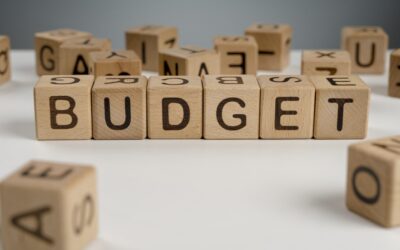Creating a budget is one of the most important things you can do to achieve financial success. It helps you keep track of your income and expenses, set financial goals, and create a plan to achieve those goals. Budgeting can also help you save money, pay off debt, and achieve financial freedom. It can, however, also feel restrictive and stifling. Having the right mindset around a budget – and its purpose – is more important than the budget itself!
In this ultimate guide to creating a budget that works for you, we will take you through the steps of creating a budget, from tracking your income and expenses to setting financial goals and creating a budget plan. We will also provide you with some useful budgeting tips, tools, and strategies that can help you achieve your financial goals.
Step 1: Track Your Income and Expenses
The first step to creating a budget is to establish your income and expenses. This will help you understand where your money is going and how much you can afford to spend each month. There are many ways to track your income and expenses, from using a spreadsheet to using an app on your phone.
When tracking your income, be sure to include all sources of income, such as your salary, bonuses, and any side hustle you may have. When tracking your expenses, be sure to include everything you spend money on, from rent and utilities to groceries and entertainment. It is helpful to use a credit card or debit card so you can visually see where all your money is going; cash can be harder to track unless you are good at keeping all the receipts!
Step 2: Set Financial Goals
The second step to creating a budget is to set financial goals. This will help you stay motivated and focused on your financial goals. Your financial goals can be short-term, such as paying off credit card debt or saving for a vacation, or long-term, such as saving for retirement or buying a house.
When setting your financial goals, be sure to make them specific, measurable, achievable, relevant, and time-bound (SMART). This will help you stay on track and measure your progress along the way.
Step 3: Create a Budget Plan
The third step to creating a budget is to create a budget plan. This will help you allocate your income towards your expenses and financial goals. To create a budget plan, start by listing all your income sources and expenses. Then, allocate your income towards your expenses and financial goals.
When creating your budget plan, be sure to prioritize your expenses and financial goals. This will help you make sure that you are allocating your income towards the things that are most important to you. It is also important to be realistic when creating your budget plan. Make sure that your expenses and financial goals are achievable based on your income. Also, make sure it is realistic based on your lifestyle. You may not be willing to give up that morning late even though you know that money could be “better spent” elsewhere, or you may not want to give up your weekly date night to stay in; an overly restrictive budget will not be sustainable.
Step 4: Monitor and Adjust Your Budget
The last step to creating a budget is to monitor and adjust your budget. This will help you stay on track and make sure that you are achieving your financial goals. To monitor your budget, review your income and expenses regularly and compare them to your budget plan. This will help you identify any areas where you may need to adjust.
When adjusting your budget, be sure to make changes that are in line with your financial goals. For example, if you need to cut back on expenses, focus on cutting back on expenses that are not essential to achieving your financial goals. If you need to increase your income, focus on finding ways to increase your income that align with your financial goals.
Budgeting Tools and Resources
There are many budgeting tools and resources available that can help you create and manage your budget. Some popular budgeting tools include Mint, YNAB, and Personal Capital or a gold fashioned excel spreadsheet. These tools can help you track your income and expenses, set financial goals, and create a budget plan.
In addition to budgeting tools, there are many resources available that can help you learn more about budgeting and personal finance. Some popular resources include personal finance blogs, podcasts, and books.
How Budgeting Can Help You Achieve Financial Freedom
Budgeting is one of the most important tools you can use to take control of your finances and achieve financial freedom. By tracking your income and expenses, setting financial goals, creating a budget plan, and monitoring and adjusting your budget regularly, you can ensure that you are making the most of your money and living within your means.
Creating a budget may seem daunting at first, but it is a crucial step towards achieving your financial goals, whether that means saving for a down payment on a house, paying off debt, or simply building up your emergency fund. There are many budgeting tools and resources available to help you get started, from online budgeting apps to spreadsheets and paper-based systems.
The key to successful budgeting is to be disciplined and consistent in your approach. Make sure to track all your income and expenses, set realistic goals, and adjust your budget as needed to stay on track. With time and effort, you can build a solid financial foundation that will help you achieve the life you want, both now and in the future.
For some though, budgeting and working with finance can be overwhelming. This can be a sign of some underlying money trauma or bad money history that needs to be addressed. You won’t be able to move forward with your money journey while your history is holding back. Money mindset is more important than the budgeting process itself!
Remember, budgeting is not just about limiting your spending or depriving yourself of the things you enjoy. It is about making intentional choices with your money that align with your values and priorities, so that you can live the life you want without worrying about financial stress or uncertainty.
In summary, if you want to create a budget that works for you, start by tracking your income and expenses, setting financial goals, and creating a budget plan. Use the tools and resources available to you and be disciplined and consistent in your approach. With time and effort, you can achieve financial freedom and enjoy the peace of mind that comes with knowing you are in control of your finances.











